#salesforce implementation service
Explore tagged Tumblr posts
Text
Maximizing Business Potential with Salesforce CRM Implementation Service
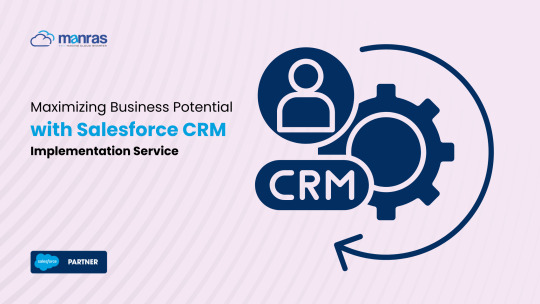
In today's competitive business landscape, leveraging the right customer relationship management (CRM) tool is crucial for success. Salesforce CRM implementation service has emerged as a powerful solution that helps businesses optimize their sales, marketing, and customer service operations. At Manras Technologies, a Platinum Salesforce Consulting Partner, we specialize in Salesforce CRM implementation services, ensuring businesses unlock their full potential with a seamless and efficient Salesforce experience. Learn more about our implementation services at Manras Salesforce Implementation.
Why Choose Manras for Salesforce CRM Implementation?
Ample Salesforce Development Experience
With extensive expertise in Salesforce CRM implementation service, Manras assists businesses in achieving their objectives by delivering fully compliant and customized Salesforce solutions. Whether you need CRM optimization or a complete business solution, our team ensures a smooth and efficient implementation process.
Certified Salesforce Development Partner
As a certified Salesforce development partner, we have a dedicated team of Salesforce coordinators, certified engineers, and administrators. This multi-stakeholder approach enables us to provide expert guidance and support for every phase of the Salesforce CRM implementation service process.
Experience Across Diverse Industry Domains
Manras has a proven track record of serving various industries, including manufacturing, retail, technical services, healthcare, banking, and communications. Our tailored Salesforce CRM implementation service solutions cater to the unique needs of businesses across different domains, ensuring seamless integration and optimized workflows.
Comprehensive Salesforce CRM Implementation Services
Manras offers end-to-end Salesforce CRM implementation services to ensure businesses make the most of their CRM investments. Our services include:
Salesforce Consulting
Our Salesforce CRM consultants take a customized approach, understanding your business model and identifying the most suitable Salesforce CRM implementation service solutions. Unlike one-size-fits-all approaches, we ensure tailored recommendations that align perfectly with your business goals. Visit our Salesforce Implementation page for more details.
Salesforce Implementation
Our skilled implementation experts work closely with businesses to set up Salesforce CRM implementation services according to their specific needs. From initial Salesforce CRM setup to post-launch support, we streamline the entire implementation process to ensure a seamless transition.
Salesforce Support
We offer 24x7 Salesforce support services to maintain system performance and reliability. Our support packages help businesses reduce downtime, resolve performance issues, and improve the overall efficiency of their Salesforce CRM implementation service.
Salesforce Quick Start Packages
Designed for small sales and customer service teams, our Salesforce Quick Start Packages include core planning, decision-making, standard and custom settings, and basic training. These packages help businesses get started with Salesforce CRM implementation services quickly and effectively.
Salesforce Staff Augmentation
Finding the right talent for your Salesforce team can be challenging. With Salesforce staff augmentation services, we help businesses select the best candidates while reducing hiring risks, time, and costs. Our experts seamlessly integrate with your team, ensuring smooth operations and enhanced productivity.
Benefits of Salesforce CRM Implementation
Enhanced Customer Engagement
Salesforce CRM implementation services enable businesses to personalize interactions, track customer behavior, and provide superior service, leading to increased customer satisfaction and loyalty.
Streamlined Sales and Marketing
With Salesforce automation tools, businesses can improve lead management, track performance metrics, and optimize sales and marketing strategies for better conversions. Learn more about this on our Salesforce Implementation page.
Data-Driven Decision Making
Salesforce CRM implementation service provides real-time analytics and AI-driven insights, helping businesses make informed decisions and drive growth.
Scalability and Flexibility
Salesforce CRM implementation services are highly scalable and customizable, making them suitable for businesses of all sizes. Whether you are a startup or a large enterprise, Salesforce adapts to your evolving needs.
Conclusion
Salesforce CRM implementation service is a game-changer for businesses looking to streamline operations, boost efficiency, and enhance customer relationships. At Manras Technologies, we offer tailored Salesforce CRM implementation services to help you achieve your business goals effectively. Our expertise, industry experience, and customer-centric approach make us the preferred Salesforce consulting partner for businesses worldwide.Get in touch with Manras Technologies today to explore how our Salesforce CRM implementation services can transform your business! Visit Manras Salesforce Implementation for more details.
Learn More: https://www.manras.com/salesforce-implementation/
0 notes
Text
Improving Salesforce's Potential: Power of Collaboration in Managed Projects
Salesforce, a well-known CRM platform, is much more than software. It's a potent instrument that can change the way businesses handle client connections and generate business success. However, realising Salesforce's full potential needs more than just technology; it also necessitates a collaborative approach. In this extensive blog, we’ll go into the value of collaboration in managed projects for Salesforce adoption. We'll look at how this method of involving important stakeholders at every level can lead to more successful and productive CRM projects.

Role of Collaboration
Collaboration is not an afterthought in Salesforce projects, but rather an essential success factor. It includes gathering a wide set of stakeholders, such as corporate leaders, Salesforce administrators, developers, and end users. Collaboration's major function is to ensure that everyone working in the project is on the same page. A collaborative approach develops a shared knowledge of the project's goals, objectives, and specific requirements by encouraging open and transparent communication.
The Advantages of Collaboration
The benefits of using a collaborative approach are numerous. First and foremost, it leads to better project alignment. When all stakeholders embrace a clear vision for the Salesforce deployment, misconceptions and misalignments are reduced. This alignment guarantees that the project continues on track to meet its objectives and goals.
Collaboration also helps to speed up decision-making processes. When important decision-makers are actively involved in the project, bottlenecks that can negatively impact the project progress are significantly reduced. Decisions made on time help to sustain project momentum and guarantee that crucial milestones are met.
Perhaps the most important advantage is the beneficial impact on user adoption. End-users have a sense of ownership and involvement when they are involved in the planning and decision-making process. As a result, they are more inclined to accept the new system, resulting in a smoother transition.
Collaborative Project Phases
A collaborative approach is most effective when it is used across all stages of a Salesforce project. Involving stakeholders is critical throughout the process, from early design and needs assessment to customization, testing, and deployment.
Collaboration during the planning process aids in establishing clear project objectives and understanding the organization's specific needs. The foundation for a successful project is established here, and a collaborative approach ensures that all stakeholders are on the same page.
Another essential stage at which teamwork shines is customization. You may design tailored workflows and reports that truly fulfil the unique business processes and requirements by involving end-users and decision-makers.
Collaboration also benefits testing and deployment since stakeholders may contribute valuable feedback, ensuring that the finished solution meets their expectations.
Collaboration Best Practises
Effective collaboration does not happen by accident; it is the result of deliberate planning and attention to best practises:
Clear communication: Establish clear routes of communication to ensure that all stakeholders are informed and given the opportunity to provide important inputs.
Regular Meeting: Hold regular meetings with stakeholders to discuss progress, address problems, and make collaborative choices.
Feedback Loops: Create feedback loops for stakeholders to submit feedback at various stages of the project, ensuring their views are heard.
Documentation: Maintain transparency and accountability by documenting all decisions, debates, and project updates.
Conclusion
A collaborative approach in managed projects for Salesforce adoption is not an option; it is required. Organisations may ensure that their Salesforce implementation is tailored to their specific needs and objectives by incorporating key stakeholders along the project journey. This collaborative approach leads to better decision-making, increased user acceptance, and, in the end, more effective CRM initiatives that promote corporate growth and success. Remember that Salesforce isn't just about the technology; it's also about the people and procedures that make it all work together effortlessly.
CRMIT is one such salesforce implementation service that can help your organisation drive growth and profitability. If you are looking to make the most out of your Salesforce solution, we are at your service. We have helped many businesses reach their true potential in various fields including finance and healthcare through our Salesforce support. Visit our website to learn more about our services.
0 notes
Text
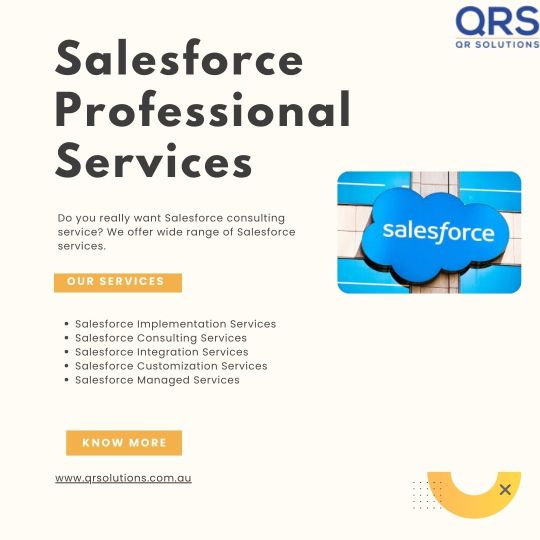
A Salesforce partner delivers not just Sales, Marketing and customer services, but also all of the popular industry segments like Health Care, Financial, and Real-estate, mining, logistics and more.
Are you stuck in implementing Salesforce with your business? Click here to get valuable services from our Salesforce experts
#salesforce partner#salesforce consulting service#salesforce implementation service#salesforce customization and configuration#salesforce integration#salesforce managed service
0 notes
Text
Salesforce Implementation Strategy to Understand, Implement and Adopt Salesforce

There are many impressive tales of how Salesforce implementation completely transforms a business. While everyone wants growth, you need to be clear as to how you will be able to scale consistently and steadily and how you want Salesforce to be a part of that.
The road to Salesforce implementation is a long one, with plenty of challenges, and you have to be in it for the long haul.
This article is a guide to understanding how to make your Salesforce implementation strategy.
What is Salesforce implementation? Why one should implement Salesforce
As the name suggests, Salesforce implementation means configuring Salesforce for a business so they can use the tool to manage their activities and communication easily and centrally.
What are the types of Salesforce implementation?
There are three ways to manage Salesforce implementation, and each has its own benefits and drawbacks. You can go for a full in-house operation where you will have full control, but it might get too expensive; or you can opt for a third-party implementation team, where you might face some initial friction, but it can be extremely cost-effective; or you can go for a hybrid approach, which might be challenging because you have to get an external team to work with your internal team.
Let’s look at the steps to implement Salesforce, which might help you determine what approach you want to go for:
Steps to implement Salesforce
1. Know what you want/need from Salesforce
Salesforce can be useful for various parts of your organization. You need to conduct a survey as to which teams and aspects of your business need it the most and are actually willing to use it to transform it. While you might want to implement its company-wide at go, you should ideally take it slow and see the change coming in before implementing it across the board.
Once you begin the implementation, you are in for the long haul, so it is crucial to have clarity on the goals you are hoping to achieve with it.
2. Set up a budget for the implementation
The Salesforce implementation cost includes licenses, consultation, data migration, integrations, training, maintenance, and support. So you need to plan a budget for the implementation. Based on your goals, you will be able to pick and choose the elements you want at the starting point, and then you can build on that to get a final rollout.
3. Put together an implementation team
When putting together your implementation team, it is not enough to find Salesforce experts. You need to find experts who have worked with organizations your size and in your industry. Such a team can truly understand what you need and even provide helpful suggestions that you might not have thought of.
Apart from that, they have worked with similar organizations before, so they also know how to work with internal teams, can assess the roadblocks intuitively, and work to solve them.
4. Plan your Salesforce implementation strategy
Salesforce implementation doesn’t stop at just implementing the tool. It only matters when your employees actually start to use it. So you need to plan the adoption strategy. While the implementation is going on, you need to conduct surveys about which challenges your teams are facing so you can prioritize those features over others.
5. Migrate your CRM to Salesforce
Without your data up until that point, the Salesforce implementation is incomplete. So you will need to migrate all your data to Salesforce first. Now, this part is not as easy as most people expect it to be. This is where it is crucial to have the right implementation partner.
Once the migration is complete, you will be that much closer to finishing your Salesforce implementation journey.
6. Gradually push out more features
With Salesforce, there is constantly something new. But that can often get overwhelming because you’re trying each and every new thing hoping to get the promised results without patiently working with a few things. So once your main implementation process is over, gradually introduce parts of the tool to your teams and let them get their hands dirty.
After the initial rollout and actual use, they will be able to give more confident feedback about what they need more of, what their new challenges are, and so on. Over time, you can keep adding new features.
7. Train your employees to get the best out of the implementation
A tool like Salesforce is most beneficial if there is a steady, consistent, and constant adoption across teams. For this, it is necessary that employees are thoroughly trained on how to use it, what they can do with it compared to manual methods, and how it can have long-term benefits.
Have your implementation partner conduct employee training with continuous support.
8. Don’t forget to take care of future support and maintenance
When a tool is constantly evolving, you can get take greater advantage of it. But it also means you have to maintain your Salesforce instance. During the implementation, your Salesforce implementation partner can access the future features you can use and help you chart a plan for it. They can also provide continual support when required.
What are the major challenges in Salesforce implementation
1. User training
Salesforce is a handful. And while parts of it are obvious and may be simple to understand, it goes much beyond the basics. So it is necessary to provide thorough training to all your employees to use it properly. Only then will they have enough input into the system and follow all processes, which will eventually lead to richer insights.
2. Getting employees to use it
Another major challenge in the Salesforce implementation strategy is to get all the teams to use it. They might try it initially but abandon it at some point in order to go back to their old method of maintaining spreadsheets of data or using disjointed software tools to manage it.
Not everyone is likely to jump into using Salesforce as soon as it is implemented because of the learning curve.
3. Getting users to maintain the data quality
Once they do start using Salesforce, users might maintain it as they like it. Without qualitative and consistent data, it is not going to be helpful in the long run when you might want to analyze patterns.
These problems are, however, easily solvable by having an expert Salesforce implementation partner. Let them handle these, and you focus on business processes and people migration.
What is the cost of implementing Salesforce?
The cost of implementing Salesforce depends on the following parameters:
Intensity of business operations
Level of the configurations/customization
No Salesforce licenses
End-user support/training
Data migration
There is no direct pricing that we can give you. But you can know that your pricing will be based on these.
How CRMJetty can help you implement Salesforce
We have been in the industry for over a decade now and have implemented Salesforce for a huge number of clients with organizations of all sizes, so we know the ins and outs of it. We have Salesforce experts on our team who can help you figure out what kind of solution you need and then take it forward from there.
Reach out to us with your requirements, and we will get you the consultation you need and until post-implementation support forever more.
Original Blog: https://www.crmjetty.com/blog/salesforce-implementation-adoption-guide/
0 notes
Link
Drive growth and build long-term success with Salesforce Professional Services to keep up with market change and customer expectations
Achieve sustainable growth and establish enduring success by leveraging Salesforce Professional Services to adapt to evolving market dynamics and meet the evolving needs of customers.
We know that companies often get confused at the time of implementing a new platform. Hence our Salesforce consultants make sure to offer full guidance at each step so that you can reap all the necessary benefits. Our experts make sure that you get the right tools and features so that you can attain the desired results.
#salesforce professional services#Salesforce professional service partner#Salesforce App Development#Salesforce App Development Services#Salesforce benefits#Salesforce Consultancy Services#salesforce consultants#salesforce consulting partner#salesforce consulting services#Salesforce Customization Services#Salesforce Implementation Service#Salesforce integration services#Salesforce#salesforce professional services company
1 note
·
View note
Text
Salesforce Implementation Partners: Missing Link in the Picture?
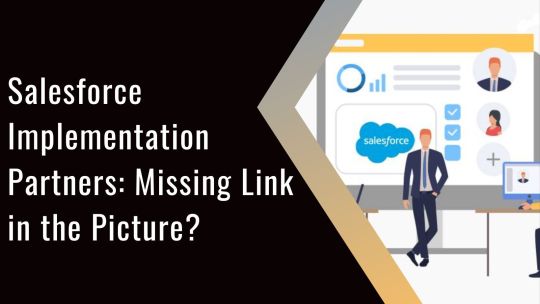
Salesforce is a powerful platform with amazing features and endless capabilities. Businesses, regardless of the industry verticals, look forward to implementing Salesforce to strengthen their relationship with customers. Though it might sound simple and easy, starting an implementation without diligent preparation and planning often results in poor outcomes, which can require time-consuming and costly rework—this is where Salesforce implementation partners come to your rescue.
This blog answers some of the most common questions that people often have about working with a Salesforce implementation partner. In addition, it also tells you how to make the most of this strategic collaboration.
In response to changes in customer behaviors, businesses of varying sizes and scopes are accelerating their digital transformation initiatives. A majority of them are interested in employing integrated, access-from-anywhere kind of solutions such as a Customer Relationship Management (CRM) software/platform— just like the ones offered by Salesforce.
Here is what the statistics have to say about one of the fastest-growing categories of enterprise software: the global spending on Salesforce is projected to be around 675 billion U.S. dollars in the current year. In the previous year, Salesforce took approximately 24% market share of the global CRM applications market.

Going forward, exploring a Salesforce CRM solution is one aspect; knowing what applications, products, as well as configurations best suit your business-specific needs is totally another matter. Perhaps, this is why a majority of Salesforce customers resort to accredited experts to ease their entry into the world of Salesforce. These dedicated experts are your implementation partners. There is a wide network of Salesforce implementation partners that assist businesses to achieve their CRM goals quickly and effectively.
What is an Implementation Partner?
To put it in simple words, an implementation partner is a company that has been approved by Salesforce after reviewing it to implement Salesforce CRM solutions on its behalf where each implementation partner specializes in some specific areas, applications, or industries. This implies that there is a partner that caters to every business need, challenge, product, industry vertical, region, etc., and assists us along the entire Salesforce journey.
Why do Businesses Need an Implementation Partner?
Salesforce CRM solutions are known to cover the entire spectrum of business operations, which include marketing, sales, service, as well as sustainability. Each of its products can be bolstered via platform-to-platform integrations and add-on applications.
In other words, the entire Salesforce ecosystem offers endless capabilities—where the main challenge is to select the right product with the integrations and configurations that best fit your business-specific needs. Consider the case in point, a big organization might already be working with multiple technological solutions. They want to figure out how a Salesforce product, for example, Marketing Cloud, can be integrated with their existing workflows without causing friction, and are looking for assistance for the same.
Take another case in point, a smaller company might be scaling upwards quickly. They also know that continuing to work with spreadsheets would not support their growth. Amidst this, they realize that they must automate their processes—or it is time to develop more streamlined and personalized customer experiences.
Implementing a CRM solution for the first time can be daunting for a majority of companies. It is a challenging task for internal teams or employees with no experience in Salesforce to take into consideration all the variables as well as implement a new and highly configurable CRM solution. Besides, hiring a full-time employee to look after the CRM implementation process can also be a costly avenue.
These were some of the situation-specific reasons that a significant chunk of Salesforce customers resort to partner applications and experts.
When is the Right Time to Engage with Implementation Companies?
As early as possible would be apt if it were to be answered in a nutshell.
You need to do your due diligence, just like you do with any significant investment. First of all, figure out what needs have to be met, gaps that have to be closed, or issues that need to be addressed. Talking of the Salesforce implementation case, you must formulate a vision of what you want to achieve that is the ‘what.’ After this, determine the ‘how,’ which is often the most complicated part for any business.
It is time to bring in a partner as soon as you figure out your goals. The right implementation partner will not just facilitate the ‘how,’ but they’ll also help you crystallize the ‘what’. They will assist you to clarify your success metrics, understanding what is realistic, as well as advise on appropriate products. Accordingly, the experts will lay out a logistically sound timeline for your implementation journey to finish it off.
It is important to note that bringing in a partner late in the game usually results in missed opportunities—in terms of understanding and scope. As the relationship between a partner and a customer is close and collaborative, the only secured way to ensure seamless implementation is when the journey begins together.
How to Figure Out the Right Implementation Partner?
Some of the implementation partners have generalized Salesforce capabilities. More often than not, these companies specialize in particular functions or areas of the CRM solution. While some might specialize in customer data platforms (CDP) or Marketing Cloud, others might specialize in harnessing the combined powers of Einstein and Sales Cloud.
Another factor is value alignment, which has come to the forefront in recent years. People want to work with companies that share their values. What we mean here is that people prefer to work with an organization that prioritizes sustainability or champions diversity and equality.
Shopping around is a good practice irrespective of whether or not these things are top-of-mind for you. Interact with different Salesforce partners, get a feel of who they are, know the way they work, and so on. As this is an important relationship, we would recommend you not settle for anything less than the right fit for your business.
Salesforce AppExchange is the best as well as a most comprehensive resource for both partners and products. There are plenty of experts and numerous applications at your fingertips where one can also browse specializations, certifications, and customer reviews.
In short, certifications, as well as credentials come into play as does the specific expertise of that implementation company.
What Challenges Might a Business Encounter During Implementation?
It has already been stressed enough that bringing in a partner as early as possible decreases the chances of challenges that might be emerging down the line.
What is also important apart from this is to be clear on what you want to solve, plus how you measure success over time. Most instances of dissatisfaction or confusion emerge from a lack of understanding on the part of the partner or the customer. Fault assumptions can be made and misunderstandings on capabilities and timelines can arise if both the parties, partner and customer are not on the same page. This makes goals, objectives, and success benchmarks harder to be reached.
As a customer, you need to be as transparent as you want your Salesforce implementation partner to be. Genuine advice is that you should never be afraid to ask questions more than once and it is better to clear all the doubts that you have got—the implementation process is highly technical in nature and seeking clarification in this is quite natural.
Just as stakeholders place the customer at the center of their business, Salesforce implementation partners place them at the center of theirs. Also, they measure their success by aligning the outcomes to your business-specific needs; in other words, by delivering exactly what you need. For dedicated Salesforce implementation companies customer success equals partner success.
Last but not the least, every successful relationship in life thrives on honest, open communication from the outset; and the Salesforce implementation partnership is no exception to this rule.
Final Thoughts
To achieve exceptional results and maximize license usage, it is important to ensure that your Salesforce solution is fully tuned to business-specific needs and well-adopted by your organization. To maximize the success of Salesforce implementation, you need to engage with a Salesforce implementation partner.
You might be missing out on the potential opportunities in terms of scope and understanding, due to insufficient resources or skill gaps. Besides, the relationship between an implementation partner and a customer is collaborative and close. So, the only way to ensure a successful implementation is when the journey begins together.
The next step is to meet and network with different partners to get a feel of who they are, what is their way of working, and so on—this is an important relationship, so you must not settle for anything less than the best fit for your business. Now that you know what is right for you, it is time to make the move.
#salesforce implementation partners in india#salesforce implementation partners#salesforce implementation companies in india#salesforce implementation companies#salesforce implementation services#salesforce implementation consultant#salesforce implementation company#salesforce cloud implementation#salesforce cpq implementation partners
1 note
·
View note
Text
A Comprehensive Guide to Salesforce Service Cloud Implementation

Salesforce Service Cloud Implementation is a game-changer for businesses looking to enhance their customer service operations. It provides a centralized platform that streamlines customer interactions, automated workflows, and improves agent productivity. Implementing Salesforce Service Cloud effectively requires strategic planning and execution to ensure seamless integration and maximum ROI.
Key Steps in Salesforce Service Cloud Implementation
Assess Business Needs – Before starting the implementation, businesses must identify key challenges, customer service gaps, and specific goals they want to achieve with Salesforce Service Cloud.
Customize the Platform – Salesforce Service Cloud offers various customization options, including case management, omnichannel support, AI-driven chatbots, and self-service portals. Tailoring these features to align with business needs ensures optimal efficiency.
Integration with Existing Systems – To leverage the full potential of Salesforce Service Cloud, businesses should integrate it with CRM, ERP, telephony systems, and other customer data platforms.
User Training and Adoption – Employee training is crucial for successful implementation. Conducting workshops and providing hands-on guidance ensures that support teams maximize the platform’s capabilities.
Testing and Optimization – Before fully deploying Salesforce Service Cloud, conducting thorough testing helps identify and fix any issues. Continuous monitoring and performance optimization ensure smooth operations.
Benefits of Salesforce Service Cloud Implementation
Enhanced Customer Support – Automates case resolution, improves response time, and ensures personalized interactions.
Omnichannel Engagement – Enables seamless communication across email, chat, phone, and social media.
AI-Powered Automation – Features like Einstein AI assist agents with predictive analytics and automated responses.
Scalability & Flexibility – Adapts to evolving business needs and growing customer demands.
Salesforce Service Cloud Implementation is a strategic move for businesses aiming to elevate their customer service experience. Proper execution ensures efficiency, increased customer satisfaction, and long-term success.
0 notes
Text
AI-Powered Transformation with Agentforce

2025 marks the rise of Agentforce AI Agents for automation, real-time decision-making, and smarter workflows. AI-driven customer engagement, campaign management, and workplace innovation are redefining success across industries.
Learn more here!
#fexle services#salesforce consulting services#hire fexle#Agentforce Consulting services#Agentforce implementation 2025
0 notes
Text
Salesforce Implementation Services in USA | Trusted Development Solution
Elevate your business with top-tier Salesforce Implementation services in USA. Unlock growth through our adept Salesforce development Services. Yantra is your trusted partner for Salesforce implementation and optimization. Our team has a proven track record of helping businesses overcome real-world challenges with innovative Salesforce solutions. To know more visit- Salesforce Implementation Services

0 notes
Text
#salesforce#salesforce cloud#CRM#CRM platform#customer service#Features of Salesforce#manage customer interactions#Service Cloud#Marketing Cloud#Commerce Cloud#Einstein AI#Analytics Cloud#Community Cloud#Mobile App#Operational Efficiency#Scalability#Security
0 notes
Text
Mastering Twilio Integration with Salesforce: A Step-by-Step Guide
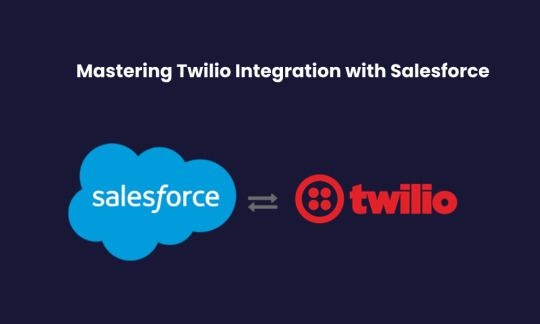
In today’s fast-paced world, communication is the key to building successful relationships with customers. With Salesforce, businesses can manage their customer relationships effectively, and by integrating Twilio, you can take your communication efforts to the next level. Twilio, a cloud communication platform, enables businesses to send messages, make calls, and even engage customers through SMS, voice, and other communication channels.
Integrating Twilio with Salesforce creates a seamless experience for customer interactions directly from the Salesforce platform, empowering sales and support teams to engage with customers in real-time. In this blog, we will walk you through the process of mastering Twilio integration with Salesforce.
Why Integrate Twilio with Salesforce?
Improved Customer Engagement: Send SMS, voice calls, and emails directly from Salesforce, enabling efficient communication with your customers.
Streamlined Workflows: Automate repetitive tasks, such as sending SMS notifications or reminders, and enhance productivity.
Enhanced Reporting & Analytics: Get detailed insights into communication metrics right within Salesforce, helping you make informed decisions.
Omnichannel Communication: Whether it’s through messaging, calls, or notifications, Twilio allows you to use a single platform for all customer interactions.
Prerequisites for Twilio-Salesforce Integration
Before diving into the integration process, ensure that you have the following:
A Salesforce Developer Account (for testing purposes).
A Twilio Account with access to API credentials (Account SID, Auth Token).
Familiarity with Apex (Salesforce’s programming language) for creating custom logic.
Step-by-Step Guide to Twilio Integration with Salesforce
Step 1: Set Up Your Twilio Account
First, sign up for a Twilio account if you haven’t already done so. After logging in, you will receive your Twilio API credentials:
Account SID
Auth Token
These credentials will be used for authentication when making API calls.
Step 2: Install Twilio’s Salesforce App (Optional)
Twilio offers a pre-built app called Twilio for Salesforce on the Salesforce AppExchange. Installing this app simplifies the integration process and provides a user interface for managing communication.
Go to the Salesforce AppExchange.
Search for Twilio for Salesforce and click on Get It Now.
Follow the installation instructions to add the app to your Salesforce org.
This app includes features like SMS messaging, call logs, and the ability to create communication templates within Salesforce.
Step 3: Create a Twilio Service in Salesforce
If you want more control over the integration or need custom functionality, you can set up Twilio within Salesforce using Apex code and REST API.
Create a Remote Site Setting:
In Salesforce, navigate to Setup > Security > Remote Site Settings.
Click on New Remote Site and enter a name (e.g., Twilio API).
Set the URL to https://api.twilio.com.
Save the remote site.
Create an Apex Class to Handle Twilio Requests:Create a new Apex class to send and receive messages using the Twilio API. This class will include logic to send SMS messages, make calls, or gather information from Twilio.
Example Apex Code to Send an SMS:
apexCopy codepublic class TwilioIntegration { public static void sendSMS(String to, String message) { String accountSid = 'your_account_sid'; String authToken = 'your_auth_token'; String from = 'your_twilio_phone_number'; HttpRequest req = new HttpRequest(); req.setEndpoint('https://api.twilio.com/2010-04-01/Accounts/' + accountSid + '/Messages.json'); req.setMethod('POST'); req.setHeader('Authorization', 'Basic ' + EncodingUtil.base64Encode((accountSid + ':' + authToken).getBytes())); req.setBody('To=' + EncodingUtil.urlEncode(to, 'UTF-8') + '&From=' + EncodingUtil.urlEncode(from, 'UTF-8') + '&Body=' + EncodingUtil.urlEncode(message, 'UTF-8')); Http http = new Http(); HttpResponse res = http.send(req); System.debug(res.getBody()); } }
This Apex class uses the Twilio API to send an SMS message. Customize the code based on your use case (e.g., adding voice functionality).
Step 4: Configure Custom Fields and Objects in Salesforce
Depending on how you want to track communication, you may need to set up custom fields or objects within Salesforce. For instance, you can create:
Custom Fields on leads or contacts to store the phone numbers and communication logs.
Custom Objects for tracking SMS or call history associated with records.
Step 5: Automate Communication with Salesforce Workflows or Flows
Salesforce’s workflow automation tools (such as Flows, Process Builder, or Apex Triggers) can be used to automatically send messages based on specific criteria.
For example, create a Flow that sends an SMS reminder to a customer when their appointment is coming up. You can trigger the Flow when the appointment date is approaching, and Twilio will send the SMS directly from Salesforce.
Step 6: Test Your Integration
Before rolling out the integration to your team, it’s crucial to thoroughly test it to ensure everything works as expected. Test sending SMS, making calls, and logging the communication in Salesforce. Make sure the API calls are successful and that messages are being sent and logged correctly.
Step 7: Monitor and Optimize
Once the integration is live, regularly monitor the performance of your communication channels. Twilio offers a dashboard where you can track message delivery status, call logs, and other analytics. Use this data to optimize your customer communication strategies.
Conclusion
Integrating Twilio with Salesforce is a powerful way to enhance your customer engagement efforts. By automating communication, tracking interactions, and providing real-time updates, you can improve the overall experience for your customers and streamline internal workflows.
Whether you use Twilio’s pre-built app or go the custom route, mastering the integration allows you to unlock new possibilities for customer communication. So, dive in, experiment with the integration, and see the impact it can have on your Salesforce workflows!
#salesforce consultant in chicago#salesforce consulting in chicago#salesforce implementation partner in chicago#salesforce consulting partner in chicago#salesforce partner in chicago#salesforce consulting partner in new york#salesforce service in new york#new york salesforce consultant partner#top salesforce consultant company in new york#best salesforce consulting and implementation partner in new york
0 notes
Text
What Makes a Salesforce Platinum Consulting Partner the Right Choice for Your Organization?
Salesforce is a powerful platform that can transform the way businesses manage customer relationships, automate processes, and improve efficiency. However, to unlock the full potential of Salesforce, it is essential to work with an experienced consultant who understands your unique business needs. A Salesforce Platinum Consulting Partner offers a wealth of expertise and proven capabilities to help you maximize the benefits of Salesforce, ensuring that your organization achieves its CRM goals. In this article, we explore the advantages of working with a Salesforce Platinum Consulting Partner and how they can help your business succeed.
What is a Salesforce Platinum Consulting Partner?
A Salesforce Platinum Consulting Partner is a consulting firm recognized by Salesforce for its deep expertise, successful project delivery, and commitment to customer success. Achieving Platinum status is no small feat, as it requires meeting stringent criteria, such as a proven track record of high-quality Salesforce implementations and expert-level certifications. Salesforce Platinum Partners typically have experience across various industries and provide services that range from system implementation to custom application development, cloud solutions, and ongoing support.
The primary difference between a Platinum Partner and other Salesforce consultants lies in their level of experience and ability to handle complex, large-scale Salesforce implementations. Platinum Partners have access to advanced Salesforce resources, including tools, training, and specialized expertise that can accelerate your Salesforce journey.
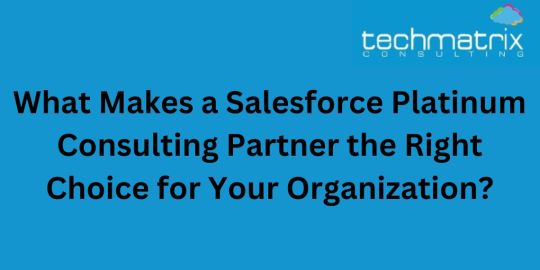
Benefits of Working with a Salesforce Platinum Consulting Partner
1. Expertise in Salesforce Solutions
A Salesforce Platinum Consulting Partner brings deep knowledge and experience to the table. They are certified experts in Salesforce products, which allows them to provide highly effective, customized solutions to fit your organization’s needs. Whether you are using Salesforce Sales Cloud, Marketing Cloud, Service Cloud, or another Salesforce product, a Platinum Partner ensures that you are leveraging the platform to its full potential.
These consultants can help optimize your CRM processes, streamline sales and marketing activities, and create tailored dashboards and reports that provide valuable insights into your business performance. Their expertise in Salesforce solutions ensures that your implementation is both efficient and impactful.
2. Customized Salesforce Implementation
Every business is unique, and your Salesforce solution should reflect that. A Salesforce Platinum Consulting Partner works closely with your team to understand your business objectives, challenges, and workflows. They then design a customized Salesforce solution that aligns with your needs, ensuring that the implementation supports your organization’s specific goals.
By tailoring Salesforce to your processes, a Platinum Partner can help improve productivity, enhance collaboration, and create a seamless experience for your team. Customized solutions also provide greater flexibility and scalability, allowing your CRM system to evolve as your business grows.
3. Faster Implementation and Time-to-Value
Time is of the essence when implementing Salesforce, and Platinum Partners have the experience and resources to deliver faster results. With their structured approach, proven methodology, and access to Salesforce’s exclusive tools, Platinum Partners can help you implement Salesforce in a shorter timeframe. This faster implementation allows your organization to start realizing the benefits of the CRM system much sooner.
Moreover, Platinum Partners have a clear understanding of the common pitfalls in Salesforce implementations and can proactively address any issues that may arise. Their deep experience helps reduce the risks associated with deployment, ensuring a smoother transition to your new CRM system.
4. Ongoing Support and Optimization
The work doesn’t stop once Salesforce is implemented. Ongoing support and optimization are critical to ensuring your Salesforce system continues to meet your evolving business needs. A Salesforce Platinum Consulting Partner offers continuous support, including system updates, troubleshooting, and optimization services, to ensure your CRM solution remains effective over time.
Platinum Partners also provide training and guidance to help your team get the most out of Salesforce, empowering users to fully utilize the platform’s features. Whether you need assistance with system updates, new feature integrations, or additional customization, Platinum Partners are there to help.
5. Advanced Tools and Resources
Salesforce Platinum Partners have access to advanced tools and resources that can enhance the implementation process. These resources include early access to new features, training programs, and support from Salesforce’s internal teams. By leveraging these tools, Platinum Partners can implement the latest Salesforce innovations more quickly, helping you stay ahead of the competition.
Additionally, Platinum Partners often participate in beta programs, allowing them to test new Salesforce products and features before they are officially released. This gives them a competitive edge when it comes to providing cutting-edge solutions to their clients.
6. Seamless Integration with Other Systems
In today’s business environment, your CRM system doesn’t exist in a vacuum. Salesforce is often integrated with other enterprise systems, such as ERP, HR, and accounting software, to create a unified platform that supports all aspects of your business. A Salesforce Platinum Consulting Partner has the expertise to ensure that your Salesforce system integrates seamlessly with these other tools, eliminating data silos and ensuring smooth information flow across your organization.
This integration enhances data accuracy, reduces manual processes, and improves decision-making. Platinum Partners can also help you optimize workflows and automate processes, further increasing operational efficiency.
7. Scalability for Growth
As your business grows, your CRM system needs to scale with you. A Salesforce Platinum Consulting Partner designs solutions that are flexible and scalable, ensuring your Salesforce system can accommodate new users, additional data, and new features as your business expands. They plan for future growth by implementing best practices and architecture that allows your Salesforce system to evolve alongside your business.
Whether you’re adding new departments, expanding to new markets, or introducing new products or services, a Platinum Partner ensures that your Salesforce solution can handle the increased demands.
TechMatrix Consulting: A Salesforce Platinum Consulting Partner
TechMatrix Consulting is a Salesforce Platinum Consulting Partner that specializes in providing customized Salesforce solutions to organizations across various industries. With expertise in Salesforce implementation, cloud strategies, app development, and marketing automation, TechMatrix helps businesses maximize the potential of their Salesforce CRM.
TechMatrix offers tailored solutions for industries such as healthcare, retail, finance, and manufacturing. Their team of certified Salesforce professionals works closely with clients to understand their unique needs and deliver solutions that optimize business processes, improve customer engagement, and drive growth.
Frequently Asked Questions (FAQs)
What is the difference between a Salesforce Platinum Consulting Partner and other Salesforce consultants? A Salesforce Platinum Consulting Partner is a firm recognized by Salesforce for its advanced expertise, proven success, and ability to handle complex, large-scale implementations. Platinum Partners have access to exclusive resources, tools, and training to ensure a high-quality Salesforce deployment.
How do I know if I need a Salesforce Platinum Consulting Partner? If your business is implementing Salesforce on a large scale or requires highly customized solutions, a Salesforce Platinum Consulting Partner is the best choice. They provide the expertise and support necessary for a smooth, efficient implementation that aligns with your business goals.
What industries do Salesforce Platinum Partners serve? Salesforce Platinum Consulting Partners serve a wide range of industries, including healthcare, finance, retail, manufacturing, and more. They offer tailored solutions that address the unique needs of each sector.
What ongoing support do I receive after implementing Salesforce? A Salesforce Platinum Consulting Partner provides ongoing support, including regular system updates, troubleshooting, optimization, and training. They help ensure that your Salesforce solution evolves with your business needs.
Can a Salesforce Platinum Partner integrate Salesforce with other business systems? Yes, Salesforce Platinum Partners specialize in integrating Salesforce with other enterprise systems such as ERP, HR, and accounting software. This ensures that your business operations work seamlessly together and enhances data accuracy.
Conclusion
Working with a Salesforce Platinum Consulting Partner provides your organization with the expertise, resources, and support necessary to fully leverage Salesforce’s capabilities. From customized implementations to ongoing optimization and support, a Platinum Partner ensures that your CRM system drives business success. Whether you are just getting started with Salesforce or looking to optimize your existing implementation, a Platinum partner like TechMatrix Consulting can help you achieve your goals.
#Salesforce Platinum Consulting Partner#Salesforce CRM solutions#Salesforce implementation#Custom Salesforce solutions#Salesforce expertise#Cloud consulting#Marketing automation#Salesforce integration#Business process optimization#Salesforce scalability#Salesforce consulting services#CRM system support#TechMatrix Consulting#Salesforce integration with ERP#Salesforce support and maintenance#Tailored Salesforce solution
0 notes
Text
Agile Salesforce Implementation Services Dallas | Vividgovtech

If you are looking for Agile Salesforce Implementation Services Dallas, you have reached the right place. We, at Vividgovtech, offer customized solutions of Salesforce, ensuring flexibility, efficiency, and scalability to your business. Being one of the best Salesforce Implementation Partners in Dallas, we recognize that every business has specific needs. Our agile Salesforce implementation is, therefore, tailored to be fast in adopting any changes to help your team extract maximum benefits from the platform.
Our team adheres to Agile methodology, which encourages iterative progress, continuous feedback, and flexibility. We can then provide high-quality Salesforce solutions much faster and give your business the fastest possible ROI. We are here to help you migrate to Salesforce, optimize your existing CRM system, or develop a custom Salesforce solution.
Why Vividgovtech for Agile Salesforce Implementation? With years of experience in the Dallas region, we bring deep knowledge about industry and a result-driven approach. We work in tight coordination with your team so that adoption is smooth and less disruptive to ensure your business unlocks the full power of Salesforce. Our process also provides ongoing support that would see your Salesforce system growing as your business needs it to grow.
We, at Vividgovtech, are dedicated to enabling scalable, innovative, and effective Salesforce solutions for businesses. Reach out to us today, and we will help transform your Salesforce experience.
Ready to unlock the power of Salesforce? Agile Salesforce implementation services Dallas are now available from Vividgovtech.
#AgileSalesforceImplementation #SalesforceDallas #Vividgovtech #SalesforceServices #CRM #SalesforceConsulting #DallasTech #BusinessGrowth #SalesforceExperts
0 notes
Text
Jade Global is a specialist in Service Cloud implementation. Whether you need to implement Service Cloud from scratch or are looking to customize your current solution, our Service Cloud experts can help you in every phase. Get your datasheet copy now.
Check out our Salesforce Services
Salesforce Professional Services
Salesforce Consulting and Advisory Services
Salesforce Revenue Cloud
Salesforce Lightning Development and Migration
Salesforce Marketing Cloud
Sales Cloud Implementations
1 note
·
View note
Link
Salesforce developers can improve productivity, automate business processes, and design custom apps. Contact us for Salesforce App Development.
Maximize your business potential with Salesforce app development services provided by our expert developers. Enhance your business productivity, streamline processes, and deliver custom solutions tailored to your unique business needs. Contact us today to learn more about how the Salesforce app development company can help you achieve your business goals.
#salesforce implementation consultants#Salesforce App Development#Salesforce App Development Company#Salesforce App Development Services#Salesforce app development services company#salesforce consultants#salesforce consulting services#customer relationship management#Salesforce development#Salesforce development companies#Salesforce development company#Salesforce app developers#integrating AI and data with CRM#Hire a Salesforce App Developer
2 notes
·
View notes
Text
Streamlining CRM with Salesforce
Introduction Customer relationship management (CRM) is at the heart of any successful business. Salesforce, with its advanced CRM capabilities, empowers organizations to manage customer interactions, track leads, and optimize sales pipelines. By leveraging Salesforce integration service, Salesforce customization, and Salesforce implementation, companies can streamline their CRM processes and stay ahead in their industries.
The Role of Salesforce Integration Service in CRM A disconnected CRM system can hinder productivity and lead to lost opportunities. With Salesforce integration service, businesses can connect their CRM to tools like email marketing platforms, customer support software, and analytics tools. This integration ensures that all customer-related data is accessible in one place, enabling teams to work more efficiently and make data-driven decisions.
Customizing Salesforce for Better CRM Standard CRM features may not meet the specific demands of every organization. Salesforce customization allows businesses to tailor their CRM to their unique workflows and preferences. From creating custom lead scoring models to designing automated workflows, customization ensures that the CRM aligns perfectly with business goals. Additionally, industry-specific customization can provide specialized features for sectors like real estate, healthcare, and retail.
Implementing Salesforce for CRM Success Successful Salesforce implementation lays the groundwork for an efficient CRM system. This involves mapping out customer journeys, configuring the platform to support those journeys, and training staff to use Salesforce effectively. Proper implementation also includes integrating data from legacy systems to ensure a seamless transition. Partnering with Salesforce experts can make the process smoother and more efficient.
Conclusion Salesforce offers unparalleled tools for managing customer relationships. By integrating, customizing, and implementing Salesforce, businesses can create a CRM system that drives customer satisfaction, boosts team productivity, and supports long-term growth.
0 notes